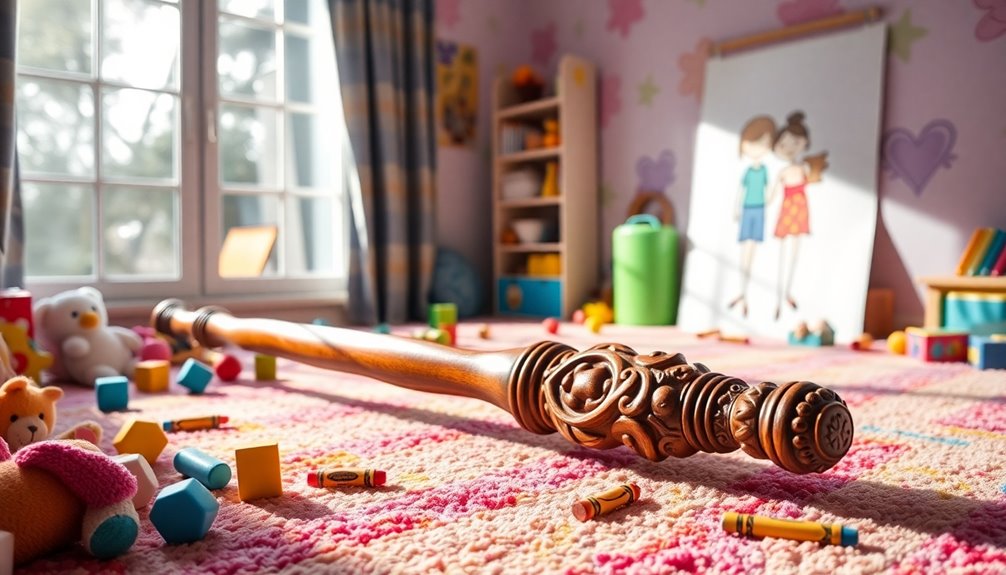The phrase "spare the rod, spoil the child" emphasizes the importance of discipline in parenting. It doesn't promote punishment but highlights the necessity of guidance and correction rooted in love. Scriptural references suggest that discipline nurtures responsible behavior and emotional growth. Misunderstanding the term "rod" can lead to harmful practices, yet it really symbolizes support and direction. Gentle communication, clear boundaries, and positive reinforcement are effective ways to discipline while fostering trust. If you explore further, you'll discover more insights on how to approach discipline in a loving and constructive manner.
Key Takeaways
- The phrase "spare the rod, spoil the child" emphasizes the importance of guidance and correction in child-rearing rather than promoting physical punishment.
- The "rod" symbolizes teaching and nurturing, reflecting a parent's responsibility to guide children towards responsible behavior.
- Biblical teachings advocate for loving discipline, linking it to emotional and moral growth rather than mere punishment.
- Misinterpretations of discipline can lead to harmful practices; discipline should focus on constructive, non-violent approaches for effective child development.
- Modern techniques, such as positive reinforcement and active listening, promote healthier parent-child relationships while maintaining effective discipline.
Introduction

Discipline is a crucial aspect of raising children, and the phrase "spare the rod, spoil the child" captures this idea succinctly. This proverb highlights the necessity of correction in child-rearing, suggesting that without it, your children may develop negative behaviors and a sense of entitlement.
While some might misattribute this saying to the Bible, it actually comes from a 17th-century poem by Samuel Butler, reflecting themes found in the book of Proverbs.
When you consider Proverbs 13:24, which states, "He that spareth his rod hateth his son," it becomes clear that discipline is an expression of love and care. The term "rod" symbolizes guidance and correction rather than mere punishment. This means that your approach to discipline should focus on teaching and nurturing rather than instilling fear.
Understanding the cultural and historical context of discipline reveals its importance for moral development. By using loving, constructive methods to guide your children, you help them grow into responsible adults.
Ultimately, discipline rooted in love lays the foundation for a healthy parent-child relationship, ensuring your children thrive both emotionally and socially.
Scriptural Basis for Discipline

When it comes to discipline, the Bible offers clear guidance that you can rely on.
Key verses from Proverbs and Hebrews highlight the importance of correction as a loving act, while Ephesians emphasizes nurturing your child's growth in faith.
Let's explore these primary and secondary references to understand the scriptural foundation for effective discipline.
Primary Bible References
This highlights that correction is essential in guiding children away from foolishness.
Moreover, Proverbs 23:13-14 encourages you not to withhold discipline, as it can lead to your child's eventual safety and well-being.
The link between correction and wisdom is further emphasized in Proverbs 29:15, suggesting that discipline is crucial for nurturing respectful and responsible behavior.
Finally, Ephesians 6:4 instructs you to bring up your children in the nurture and admonition of the Lord, reinforcing the idea that loving discipline is vital in parenting.
Secondary Bible References
In exploring the scriptural basis for discipline, Proverbs 22:6 stands out, emphasizing the significance of training children in the right way. This early guidance is crucial for instilling values that last a lifetime.
Hebrews 12:5-11 reinforces this idea, noting that God's discipline is an expression of love, reminding you that correction is necessary for growth and character development.
Proverbs 29:15 links correction with the cultivation of wisdom and respect, showing that discipline is an essential component for nurturing responsible behavior. When you "spareth his rod hateth his son," it highlights the serious consequences of withholding discipline.
In contrast, Proverbs 19:18 warns against neglecting discipline, as it can lead to negative outcomes for your child's future.
Ephesians 6:4 further advises you to bring up your children in the training and instruction of the Lord. This balanced approach to discipline incorporates guidance rather than provocation, ensuring your child understands the reasons behind their correction.
Ultimately, loving discipline shapes a strong foundation for your child, equipping them to navigate life's challenges with wisdom and integrity.
Ancient Parenting Practices Examined

Throughout history, parenting practices have evolved significantly, yet ancient methods continue to influence contemporary views on discipline. In Hebrew society, the rod of discipline symbolized a necessary tool for correction, reflecting the belief that discipline is essential for both moral upbringing and societal order. The Talmudic tradition, steeped in ancient Jewish teachings, often interpreted corporal punishment as a common practice. However, it emphasized humane treatment and guidance after punishment, ensuring that children understood the reasons behind their discipline.
Historical figures like Rambam and Rav Shlomo Wolbe advocated for a cautious approach, suggesting that corporal punishment should be gentle and age-appropriate. They believed that a parent who truly loves him is diligent in maintaining a balance between correction and compassion. This balance resonates with the idea of establishing healthy boundaries, which promotes respect and understanding in parent-child relationships.
In ancient cultures, discipline was seen as an expression of love and responsibility, integral to instilling character and values. This approach aligned with communal and faith-based expectations, where God disciplines those He loves.
While cultural shifts have prompted a reevaluation of these practices, the core belief in the importance of discipline remains, influencing modern parenting methods that prioritize non-violent approaches while still valuing structure and guidance.
Cultural Context of Discipline

Discipline, often viewed through the lens of cultural norms, varies widely across societies and historical contexts. In ancient Hebrew society, discipline was crucial, with the "rod" serving as a metaphor for authority and guidance. This reflects a strong belief that careful discipline was essential for a child's moral upbringing. Historically, corporal punishment was common among shepherds and parents, intended to instill respect and obedience.
However, cultural shifts have influenced modern interpretations of discipline. Today, many societies increasingly reevaluate traditional punitive methods, favoring nurturing approaches over strict measures. Some cultures advocate for positive reinforcement and gentle guidance, while others maintain a stricter stance on discipline.
As societal norms around children's rights evolve, there's a growing awareness of the potential harm of corporal punishment. This has led to a broader understanding of discipline that encourages non-violent methods.
Ultimately, how you choose to discipline your child reflects the cultural context you belong to, and it's vital to consider these perspectives. By being mindful of these varying views, you can approach discipline in a way that aligns with both your values and contemporary understandings of child welfare, ensuring you don't spoil the child.
Misinterpretation of "Rod" Meaning

When you hear "spare the rod, spoil the child," it's easy to think it's all about punishment.
However, many misunderstand the term "rod" as a tool for abuse, missing its true meaning of guidance and care.
Let's clarify how this misinterpretation confuses discipline with harmful actions.
Debunk Common Misunderstandings
The phrase "spare the rod, spoil the child" often conjures images of physical punishment, but that's a misunderstanding rooted in misinterpretation. The term "rod" actually symbolizes guidance and correction in parenting. Proverbs 13:24 emphasizes that discipline is an expression of love, not a call for abusive practices.
When you look deeper, the Hebrew word for "rod," or "shevet," refers to a tool for guidance, much like a shepherd uses a staff. This highlights the nurturing aspect of discipline rather than inflicting harm.
Misunderstanding the meaning of the rod can lead you to adopt harmful parenting practices that contradict the biblical principles of love and constructive discipline. Historically, the rod served as an instrument for teaching and correction, aiming to direct children toward better behavior and understanding.
It's essential to recognize that loving discipline involves setting boundaries and teaching lessons, not instilling fear or pain. By embracing this perspective, you can foster an environment where your children feel safe and cherished, ultimately helping them grow into responsible and compassionate individuals.
Discipline Versus Abuse Confusion
Understanding the difference between discipline and abuse is crucial for effective parenting. Many parents misinterpret the term "rod" in the saying "spare the rod, spoil the child," believing it justifies harmful punishment. However, the rod symbolizes guidance and correction, not physical harm. When someone thinks, "rod hates his son," they miss the loving intent behind discipline.
This confusion often leads to abusive practices, where harmful physical punishment is mistakenly seen as acceptable discipline. Biblical interpretations emphasize nurturing and constructive approaches, steering clear of methods that inflict pain and cause lasting emotional damage. The goal of discipline should be to teach and guide, not to hurt.
Historical and cultural contexts show that while the rod was once a correction tool, it was used for moral instruction rather than causing suffering. Modern psychology supports this view, highlighting that corporal punishment can severely impact a child's emotional and psychological development.
As a parent, focus on loving discipline that fosters growth, understanding, and respect. By recognizing the true meaning of the "rod," you can create a supportive environment that encourages your child to thrive without confusion between discipline and abuse.
Parental Guidance Techniques

When it comes to guiding your children, gentle communication is essential.
By using faith-based parenting workshops, you can learn techniques that foster understanding and connection within your family.
These approaches not only encourage positive behavior but also help you build a supportive environment for your child's growth. Additionally, incorporating open communication about feelings can significantly enhance the emotional support your child receives during challenging times.
Gentle Communication With Children
Gentle communication with children is crucial for fostering a nurturing environment where they feel safe to express themselves. By prioritizing active listening, you can understand your child's feelings and concerns, which builds a trusting relationship. This trust encourages open dialogue and helps in effective discipline from a child.
Positive reinforcement is an essential part of gentle communication. When you praise and encourage your child, it not only boosts their self-esteem but also motivates them to exhibit desired behaviors. Studies show that children respond far better to positivity than negativity, making this approach vital.
Set clear and consistent boundaries while communicating your expectations. This helps kids understand limits and promotes a sense of security essential for their emotional development. By employing "I" statements like, "I feel upset when toys are left out," you can express your feelings without blaming your child. This encourages empathy and understanding.
Lastly, teach conflict resolution skills through role-playing scenarios. This helps kids learn to express their emotions constructively and resolve disagreements peacefully, laying the groundwork for effective communication throughout their lives. Additionally, federal funding supports state foster care systems, which highlights the importance of a stable environment for children's emotional well-being.
Faith-Based Parenting Workshops
Faith-based parenting workshops offer valuable insights into balancing discipline with love, guiding parents to foster moral development in their children. These workshops emphasize loving correction, helping you align your discipline methods with biblical principles. By incorporating teachings from Proverbs 22:6, you learn how to guide your child in the right way, ensuring that when they grow older, they won't depart from it.
During these sessions, you'll discover the importance of creating a nurturing environment that balances discipline with warmth and understanding. This approach promotes positive parent-child relationships, making it easier for you to connect with your child.
Common misconceptions about corporal punishment are addressed, advocating instead for gentle discipline techniques that align with modern psychological insights and scriptural teachings.
Additionally, these workshops provide you with reading materials and community support networks. Such resources help you apply effective discipline strategies consistently and thoughtfully.
As you embrace these teachings, remember that when you love them diligently, your child is more likely to thrive emotionally and spiritually.
Ultimately, faith-based parenting workshops equip you with the tools to nurture your child's growth while instilling essential values in their lives.
Effective Discipline Encourages Growth

Effective discipline is a cornerstone of healthy child development, guiding them toward responsible behavior while nurturing their emotional and moral growth. When you implement effective discipline rooted in love and guidance, you're not just correcting misbehavior; you're fostering your child's ability to learn and adapt.
Research shows that children who receive consistent and constructive discipline are more likely to exhibit self-control and resilience when faced with challenges.
Incorporating positive reinforcement and appropriate corrective measures helps your child learn from mistakes, developing a strong sense of right and wrong. This balanced approach, blending guidance with affection, results in better academic performance and enhanced social skills.
As you practice effective discipline, you're equipping your child with the tools they need for long-term success. Studies indicate that this nurturing discipline leads to reduced behavioral issues and increases the likelihood of achieving personal and professional goals in adulthood. Furthermore, providing a supportive environment that encourages self-regulation fosters emotional intelligence and better decision-making skills.
Additional Resources

Numerous resources are available to help you navigate the complexities of parenting with a focus on loving discipline. The Unity World Headquarters offers newsletters that provide insights on spiritual parenting principles, emphasizing non-punitive discipline strategies.
Engaging with community platforms, including social media, can also enhance your discussions on effective child-rearing practices aligned with these teachings.
Recommended readings like "Punishments, Consequences, and Limits" and "Peaceful Parenting Won't Work on My Child" present practical strategies for implementing gentle discipline methods. These books can guide you in fostering a nurturing environment for your children, steering you away from punitive measures.
Additionally, the "Anti-Childism Scale" serves as a valuable tool to evaluate your awareness of children's rights, helping you find a balance between discipline and freedom in your parenting practices.
Various online forums and workshops also focus on the importance of creating supportive spaces for children, highlighting the long-term benefits of loving discipline over punishment. Furthermore, exploring stress management techniques can aid parents in maintaining emotional balance while navigating the challenges of child-rearing.
Frequently Asked Questions
What Does Spare the Rod and Spoil the Child Really Mean?
The phrase "spare the rod, spoil the child" suggests that without proper discipline, children may not develop the necessary character and morals.
It emphasizes the importance of guidance in a child's upbringing. You should focus on teaching rather than punishing, ensuring that discipline is constructive.
What Does Proverbs 22:15 Mean?
Proverbs 22:15 emphasizes the importance of discipline in a child's upbringing. It suggests that children naturally harbor foolishness, and without guidance, they may stray.
You need to recognize that the "rod" symbolizes corrective measures, not just punishment. By providing loving discipline, you help steer your child toward wisdom and good behavior.
This verse highlights that consistent, compassionate correction shapes their moral foundation and ultimately contributes to their well-being and development.
What Does the Rod Mean in Proverbs 13:24?
In Proverbs 13:24, the "rod" represents authority and guidance in discipline.
It highlights the importance of correcting a child's behavior as a loving act, not just punishment. You can think of the rod as a tool used by a shepherd to guide and protect their flock.
What Bible Verse Says Spare the Rod and Spoil the Child?
The phrase "spare the rod, spoil the child" isn't a direct quote from the Bible.
It's often linked to Proverbs 13:24, which actually states, "He that spareth his rod hateth his son."
This verse emphasizes the necessity of discipline in parenting.
It's crucial to understand that the "rod" symbolizes guidance and correction, not just punishment.
Effective discipline shapes a child's character and wisdom, fostering growth rather than fear.










